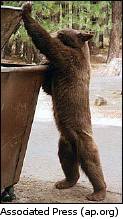 Environment
Environment
Don's Home
 Environment
Environment
|
| See Also Tahoe Bears |

Since the 1980s the Garden State's black bear population has been increasing and expanding its range both southward and eastward from the forested areas of northwestern New Jersey. Within the most densely populated state in the nation, black bears are thriving and there are now confirmed bear sightings in all 21 of New Jersey's counties. See NJDEP Division of Fish & Wildlife - Know the Bear Facts-Black Bears in NJ
This is not a problem as long as people take measures to stop attracting bears to residential areas and avoid conflict with those who do wonder thru.
- Tips on Reducing Conflicts and Encounters with Bears During Active Spring Period (www.state.nj.us/dep/newsrel/2012/12_0040.htm) at the Div. of Fish & Wildlife There are additional tips if you live in the NW part of the state with a large black bear population.
The Div. of Fish & Wildlife in the Department of Environmental Protection (NJDEP) is responsible for Bear Management in the state.
Although rare, bears will kill small pets. Keep them on a leash when walking them.
Under the law, NJSA 23:2A-14, enacted in 2002, people caught deliberately feeding bears could be fined up to $1,000. Violators receive a written warning for the first offense, but are subject to a civil penalty for every subsequent offense.
| |||||||||||||
|
Bear Myths and Misconceptions Posted on NextDoor by Julie Mason, Kings Beach, CA From Myths and Misconceptions at North American Bear Center ELy MN The main mission at the North American Bear Center is to educate! This post will do just that as we dispel some common misconceptions and myths about black bears. Myth 1.) Mother black bears are likely to attack humans in defense of cubs. The truth: this is a highly unlikely behavior from a mother black bear. Mother black bears rarely attack humans, but they do frequently exhibit bluff charge and blustery behavior in defense of their cubs. It is often interpreted as aggression towards humans, but is really a reflection of their own anxiety and fear. There has only been a handful of recorded attacks on humans from a mother black bear defending cubs. Brown bears on the other hand (which dont exist in the Tahoe/Truckee area) will attack humans in defense of cubs, which is mostly likely where this myth comes from. Ely bears researchers have taken screaming cubs from mothers in their dens (only for a brief time to record scientific data) without the mothers attacking. They would slap the ground and act ferocious, but would refuse to make contact with the researchers. Myth 2.) Mother bears will reject cubs with human scent. The truth: this is completely untrue with bears as it is with other mammals and birds. Human scent does not cause the parents to reject caring for their offspring. Most people probably hear this from their parents (or other adult) at a young age, but the fact is that there isn't any evidence to support this. Although you should never approach and handle a baby wild animal (unless conducting approved research and trained to do so), your human scent will not cause the parents to abandon its young. Wildlife rehabilitators have raised young animals and released them to their parents (or other adults with offspring) with no issues due to human scent. Myth 3.) Black bears will attack if they sense fear. The truth: no they won’t. Black bear attacks are very rare in general, but fear in humans does not make bears more likely to attack. In fact, most people probably have a primal feeling of fear if they have ever encountered a bear when not expecting it. It is a large and powerful animal that is often portrayed as aggressive and mean; why wouldn't you be fearful in an unexpected encounter? In 1984, Ely bear researchers inadvertently tested whether or not fear provokes an attack from black bears. A researcher tripped and fell flat on his back while trying to move away from a bluff-charging mother black bear. The mother stood over him. He lay petrified, no doubt reeking of fear. His heart raced. After a few long moments eyeball to eyeball, the mother turned and walked back to her cubs. She never touched him. | ||||||||||||
See:
NJDEP Division of Fish & Wildlife - Bear Facts for Homeowners Bear Safety Tips Garbage Management See others at above site (Facts for Homeowners) - Know the Bear Facts-Black Bears in NJ Tri-fold brochure - Tips on Reducing Conflicts and Encounters with Bears During Active Spring Period Bear Safety under recreation Bear Smart Society How to Live with Black Bears at the U.S. Forest Service Bear Pepper Spray: It Works! - Sierra Club (primarily for use in Grizzly Country) Sierra Club Delta (Louisiana) Chapter Louisiana Black Bear Quiz page SaveNJBears.com | |||||||||||||